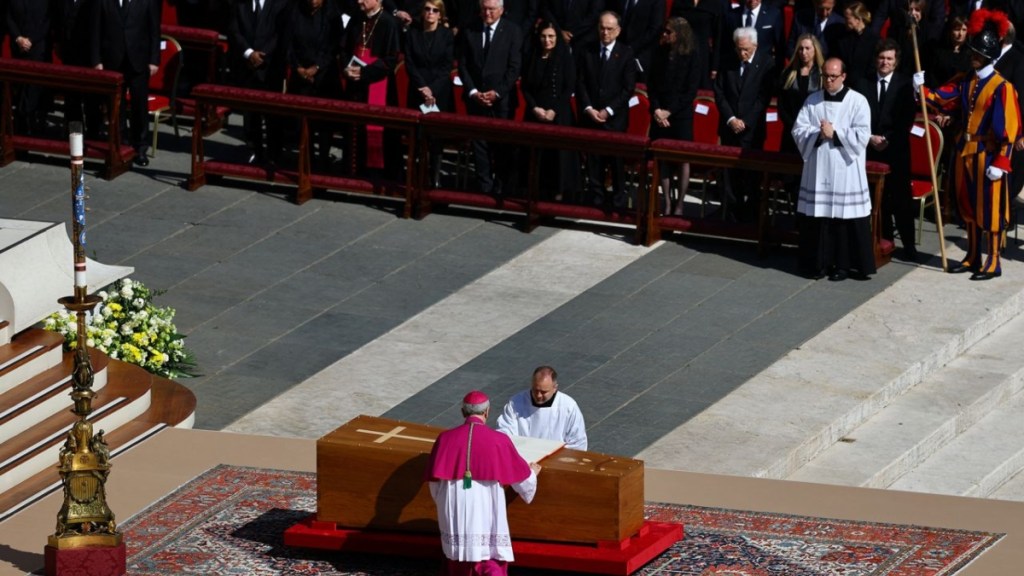The Vatican announced on Monday that the conclave to elect a successor to Pope Francis will commence on Wednesday, May 7. The date for the conclave was a key topic of discussion during informal meetings held by cardinals to address church matters following the death of Pope Francis on April 21. The announcement was delayed until after the pope’s funeral on Saturday. The Vatican confirmed that over 180 participants attended the fifth informal meeting in Rome on Monday. However, only the College of Cardinals, a smaller group of 135, is eligible to elect the new pope.
The atmosphere around the Vatican was charged on Monday, with reporters flooding St. Peter’s Square, shouting questions to cardinals as they arrived. In the chaotic scenes, topics ranged from unity among electors to the eligibility of controversial figures like Cardinal Angelo Becciu, who was convicted last year in a Vatican financial crimes trial but continues to insist on his right to vote.
“There is the hope of unity,” said Cardinal Ángel Sixto Rossi of Argentina, who was appointed by Pope Francis in 2023. Many cardinals, particularly those from Latin America and parts of Asia, have voiced a desire to continue Pope Francis’ focus on pastoral care, inclusion, and outreach to the marginalised. However, more conservative factions are said to favor a return to doctrinal clarity and tradition, echoing the legacy of Pope John Paul II and Pope Benedict XVI.
British Cardinal Vincent Nichols, a senior figure in the College of Cardinals, stressed the importance of unity within the Church. “The role of the pope is to essentially hold us together, and that’s the grace we’ve been given from God,” he told reporters, downplaying ideological divisions.
Cardinal Baltazar Porras of Venezuela expressed confidence in a swift decision once the conclave begins, estimating a new pope could be chosen “between two and three days.”
The College of Cardinals currently includes 135 eligible electors under the age of 80, 108 of whom were appointed by Pope Francis. However, not all are guaranteed to participate. A Spanish cardinal has already excused himself for health reasons, and questions remain around Becciu’s eligibility. Though officially listed as a “non-elector,” he has been attending pre-conclave meetings and claims his right to vote remains intact — a matter currently being reviewed by canon lawyers.
Among the possible contenders, Italian Cardinal Matteo Zuppi, a prominent figure in Francis’ inner circle, drew media attention as he jokingly navigated a crowd of reporters. Meanwhile, speculation continues around the influence of African cardinals, many of whom opposed Francis’ progressive outreach to LGBTQ+ Catholics. Nigerian Cardinal John Onaiyekan, although too old to vote, emphasised the seriousness of the process: “We have not come here for a political rally. We have come to get a pope out.”
Cardinals from Asia and Latin America echoed hopes for a leader who can balance tradition with compassion. Indian Cardinal Anthony Poola highlighted the spirit of unity among the electors, while Rossi said he hoped the values championed by Pope Francis — “mercy, closeness, charity, tenderness, and faith” — would guide them in their choice.
Still, the gravity of the moment is not lost on the participants. When asked how he felt about taking part in his first conclave, Cardinal Rossi replied with a smile, “Afraid?”
As May 7 approaches, the world watches closely as the Catholic Church prepares to choose its next spiritual leader — one who will not only inherit Pope Francis’ legacy but also shape the future of the Church in a rapidly changing world.
(This is an updating story)
(With AP Inputs)


